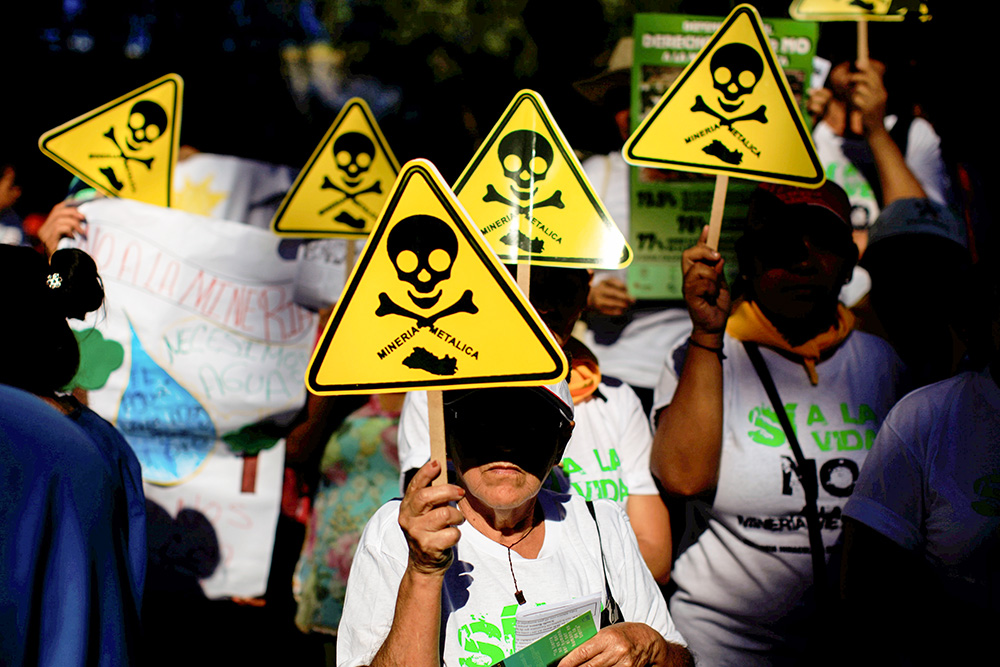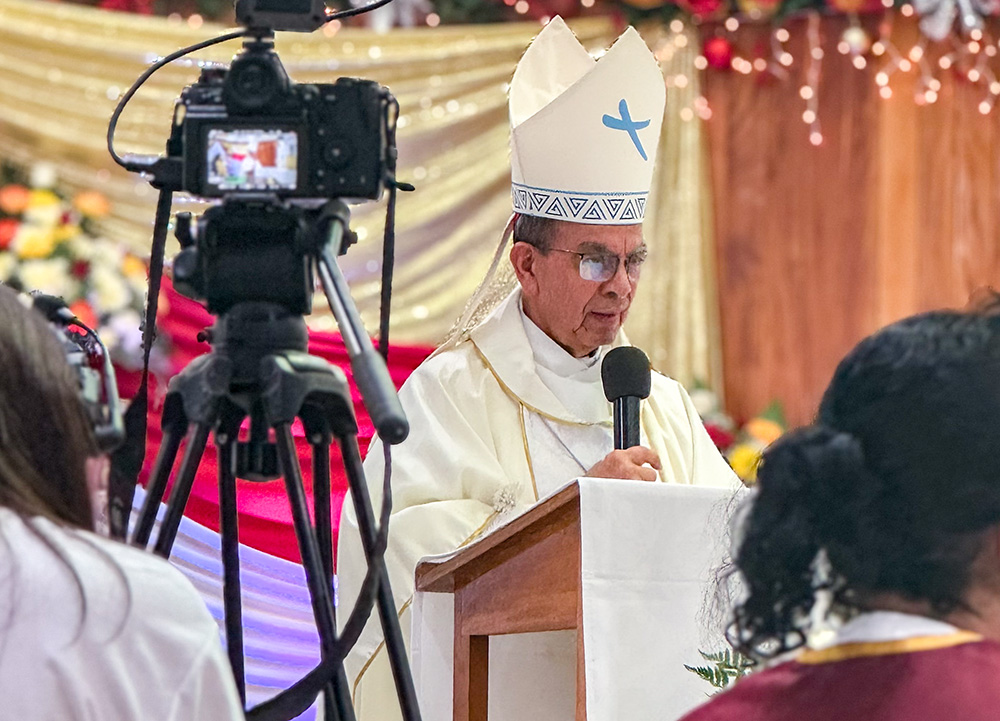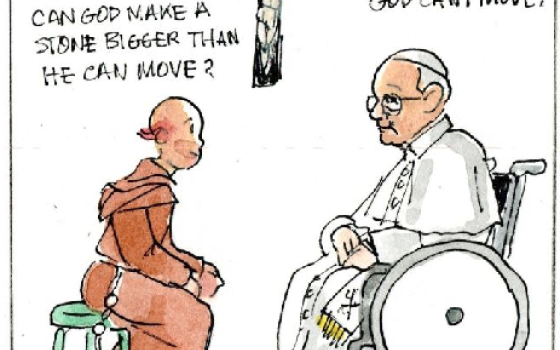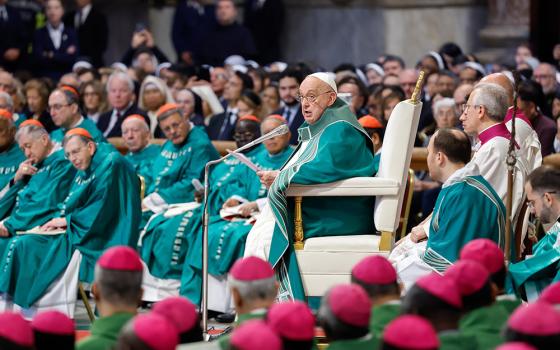
Protesters march against metal mining in a demonstration convened by the Catholic Church in San Salvador, El Salvador, March 9, 2017. That year, the country became the first in the world to ban metal mining. (CNS/Reuters/Jose Cabezas)
El Salvador's Cardinal Gregorio Rosa Chávez told fellow Salvadorans to resist a new law that reverses the country's ban on metal mining, saying that preventing contamination of the country's water supply is a matter of life and death.
"We have to be prophets of hope" and prevent water contamination due to mining, "including physically, if necessary," Rosa Chávez said Dec. 28 in a homily at the Cathedral of Chalatenango, one of the areas in northern El Salvador in the path of a proposed gold and silver mining project.
"This region provides water for the entire country. If it becomes contaminated, we all die," said Rosa Chávez, retired auxiliary bishop of San Salvador.
In 2017, El Salvador made international headlines when it became the first country in the world to ban metal mining, including in the vast "gold belt" in the country's northern regions. Along with gold, metal mining extracts from the Earth's crust other precious metals like silver and platinum, and substances like copper, zinc and iron-rich elements often used in building.
Seven years after El Salvador's legislative assembly voted unanimously to halt metal mining, the assembly on Dec. 23 overwhelmingly approved a new law reversing the ban, saying that mining will "spur economic development." The law will allow exploration, extraction and processing of the nation's gold deposits as well as exploration for rare-earth minerals like lithium, cobalt and nickel that are increasingly sought for renewable energy projects and battery storage.
Advertisement
Catholic leaders in the country backed the anti-mining effort when the ban was first proposed, and Salvadoran Catholics took part in large-scale public protests and informational campaigns outside parishes, and spoke to lawmakers about the dangers posed. A main driving force behind the campaigns was to protect the country's supply of clean water, which was already limited in rural areas and heavily polluted from agricultural runoff and sewage, according to a study by the nation's environmental ministry.
Gold mining requires large amounts of water. In addition, toxic chemicals like mercury, cyanide, lead and arsenic are often used in extracting the ore, which can pollute ecosystems and waterways as well as pose health hazards to people. The United Nations Environment Program estimates 37% of global mercury pollution comes from small-scale and artisanal gold mining, and roughly one-third of artisanal miners are exposed to unsafe levels of metallic mercury vapors.
A December survey showed the majority of Salvadorans believing El Salvador is "not an appropriate country" for mining. In the face of such opposition, lawmakers "went into hiding," avoiding the press and the public's wave of discontent after what they had done, Rosa Chávez said.
But now there's unity from those banding to protect the right to clean water, the cardinal said.

Salvadoran Cardinal Gregorio Rosa Chávez talks about resisting a mining law in a homily Dec. 28, 2024, at the Cathedral of Chalatenango in northern El Salvador. Legislators, saying that mining will "spur economic development," approved on Dec. 23 a new law that reverses a previous ban on metal mining in the country, but Salvadoran bishops say the life and health of Salvadorans is "worth more than all the gold in the world." (NCR photo/Patricia Lazo)
"We were like a sleeping giant, distracted by fireworks, shows, mega projects, and suddenly we realized that the country we want is not that type of country," he said.
Joining Rosa Chávez at the conclusion of the Dec. 28 Mass, Chalatenango Bishop Oswaldo Escobar Aguilar said, "Chalatenango says 'no to metal mining.' Let's defend our [state]."
Escobar told EarthBeat Dec. 30 that the country's bishops have spelled out their opposition, not because they don't want economic development but they don't want it at the expense of the well-being of Salvadorans, particularly the poor.
"Why do we resist mining? Because we are the most deforested country in Latin America after Haiti," he told EarthBeat in a WhatsApp audio. "It would contaminate the water. It is not a viable solution for this country."
Before the new law was approved, El Salvador's bishops spoke against the proposal.
"We are in favor of economic development. However, the biggest wealth for the people of a nation is their life and their health and that is worth more than all the gold in the world," the bishops said in a Dec. 14 statement.
The bishops doubled down in a Dec. 24 statement, saying they were disappointed that lawmakers had not listened to the will of the people already expressed by the 2017 mining ban.
"We call on the authorities to reconsider their decision and repeal this new mining law, which will produce many victims, starting with the most vulnerable, but which will then harm everyone, including new generations" and harm the environment, the bishops said.
Rosa Chávez said prelates are hoping that the government will "reconsider" and are waiting for an answer. After passing through Congress, the new law must be signed by Salvadoran President Nayib Bukele, who has indicated he will do so. Bukele has called the mining ban "absurd."
Zaira Gutiérrez, of the Apostolics of the Heart of Jesus in San Salvador, told EarthBeat Dec. 30 that Catholic groups, which include consecrated men and women involved in defense of the environment, stand behind the bishops' statement and have taken part in protests outside the legislative hall in San Salvador against the new law.
"As a church and as environmental organizations, we're paying attention to all that's going on," she said.








